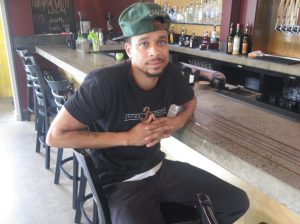
Davon Miller, a restaurant manager in Charlottesville, Va., had his voting rights restored in 2014 with the help of the progressive group Virginia Organizing. (DANIEL DALE)
The state’s racist law blocks ex-offenders from voting for life without the governor’s personal approval. Black Virginians are disproportionately disenfranchised.
RICHMOND, VA.—The crowd at the 2nd St. Festival was thick and loud on Saturday afternoon, and Sir James Weaver, an especially motivated voter registration canvasser, had to shout over the go-go band to ask people if they were signed up.
He got dozens of nods and smiles. Then, as night fell in Richmond and the music in the historic black neighbourhood of Jackson Ward finally stopped, the lanky 27-year-old approached an older man sitting by himself on a bench.
“I can’t,” Khaali Richardson, a 50-year-old with a goatee and a camouflage shirt, said with a grimace. “I got a violent felony.”
Specifically, he mugged somebody as a 19-year-old in 1986. And he made the additional mistake of doing it in Virginia.
In most of the country, felons get their voting rights back after leaving prison or finishing their probation. In Virginia, they never get them back. The state is one of four that bans ex-felons from voting for their entire lives unless the governor personally approves their reinstatement.
Virginia’s harsh law is now the subject of a furious political battle that may have world-changing implications for the presidential election. Like almost every U.S. fight over matters of voting rights, from voter ID to early voting, this one is inseparable from race.
The lifetime felon ban, which dates to 1830, was included in the segregationist 1902 state constitution that aimed to limit black freedom and influence. Because black people are disproportionately likely to be convicted felons, it still curbs the political power of their community.
Which is, critics say, still the point.
“It’s just a more evolved or sophisticated Jim Crow. They just do it more subtle,” said Richardson, who has worked for 15 years at a chicken processing plant. “That’s another way they impose supremacy. To keep us behind, basically. And make it harder for us — not impossible, but very hard to get ahead. You can’t vote, then you can’t vote for the people that might help you get resources that you need.”
By one credible estimate, one in 13 black people — more than two million in all — is currently disenfranchised over a felony. The equivalent number for non-black people is one in 55.
Ex-felons, often poor, vote at low rates: 23 per cent in one 2008 study. But tens of thousands of extra ballots are more than enough to potentially change presidential, state and local outcomes in perpetually close states like Virginia and Florida, which also imposes a lifetime ban.
Advocates of the harsh policies say criminals forfeited their political say when they harmed fellow citizens. Ex-offenders say voting rights should be irrevocable — and that they can’t fully reintegrate without them.
“I feel like voting rights is a voice. When you take that voice away, you’re left mute. You don’t feel whole,” said Davon Miller, 29, a soft-spoken restaurant manager in Charlottesville, Va., who had his rights restored in 2014 with the help of the progressive group Virginia Organizing. “You don’t feel like a citizen. For a long time I felt alienated. I couldn’t do the things that normal citizens — or other citizens — were able to do.”
Virginia’s long-running debate has hit a fever pitch in the last six months. Gov. Terry McAuliffe, a Democrat, announced from the steps of the state capitol in April that he was going to simultaneously restore the voting rights of 206,000 people with convictions for violent felonies. Nearly half of them were black.
Republicans were outraged, arguing that he was merely trying to help Hillary Clinton win a swing state, and they filed a lawsuit. The state Supreme Court then voted 4-3 to overturn the order, agreeing that McAuliffe did not have the authority to order a blanket restoration. McAuliffe then vowed to restore all 206,000 individually.
The current one-by-one application system is entirely unknown to thousands of the state’s ex-offenders. Richardson was unaware that he could even ask the governor for his rights.
Weaver gave Richardson a form. Though Weaver was wearing an orange shirt with the name of the progressive group that employs him, New Virginia Majority, Richardson was so skeptical that he declined to fill out the line requesting his Social Security number.
“They’re not being informed when they get out. They’re hearing it from third parties,” Weaver said later. “I don’t know whose responsibility it is exactly, but somebody should be telling them.”
A growing number of Republican elites favour an easing of the restrictions. McAuliffe’s Republican predecessor, Robert McDonnell, made it substantially easier for non-violent felons to get returned to the voter rolls. But enough party voters prefer a hard line — six in 10 in one Virginia poll — to make any softening politically perilous for conservative legislators.
Arthur Walker, a courteous 56-year-old, was one of the 13,000 people who obtained his voting rights after McAuliffe signed the order. He lost them again after the Republicans won their legal challenge.
Walker served six years in prison in the 1990s for drug trafficking. For the last 15 years, he has worked as a cook and waiter at Mel’s Cafe, a comfort food establishment in Charlottesville, “just working and making a living as a regular person in society.”
“I want to participate,” he said.
He missed his chance to vote for the first black president. He wants to vote for the first female president. His explanation: “So all people are included in this democracy, not just the blue-blooded white men running everything.”




